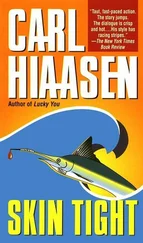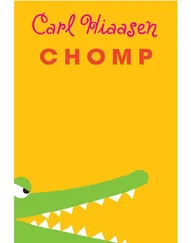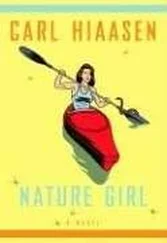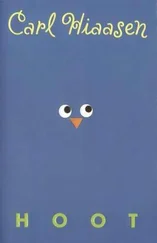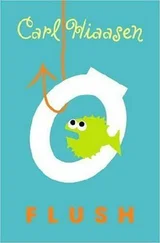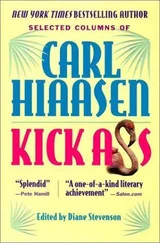Carl Hiaasen - A Death in China
Здесь есть возможность читать онлайн «Carl Hiaasen - A Death in China» весь текст электронной книги совершенно бесплатно (целиком полную версию без сокращений). В некоторых случаях можно слушать аудио, скачать через торрент в формате fb2 и присутствует краткое содержание. Жанр: Детектив, на английском языке. Описание произведения, (предисловие) а так же отзывы посетителей доступны на портале библиотеки ЛибКат.
- Название:A Death in China
- Автор:
- Жанр:
- Год:неизвестен
- ISBN:нет данных
- Рейтинг книги:3 / 5. Голосов: 1
-
Избранное:Добавить в избранное
- Отзывы:
-
Ваша оценка:
- 60
- 1
- 2
- 3
- 4
- 5
A Death in China: краткое содержание, описание и аннотация
Предлагаем к чтению аннотацию, описание, краткое содержание или предисловие (зависит от того, что написал сам автор книги «A Death in China»). Если вы не нашли необходимую информацию о книге — напишите в комментариях, мы постараемся отыскать её.
A Death in China — читать онлайн бесплатно полную книгу (весь текст) целиком
Ниже представлен текст книги, разбитый по страницам. Система сохранения места последней прочитанной страницы, позволяет с удобством читать онлайн бесплатно книгу «A Death in China», без необходимости каждый раз заново искать на чём Вы остановились. Поставьте закладку, и сможете в любой момент перейти на страницу, на которой закончили чтение.
Интервал:
Закладка:
"Yes, of course." But what did it mean, damn it?
Wang Bin looked at Stratton sharply, as though he had divined the wandering of a perplexed mind. From the table he took a leather-bound volume that looked like a diary. He handed it to Stratton.
"Here, this is my brother's journal. Apparently he was addicted to writing something nearly every day. I was interested in his first impressions of China.
I would be grateful if you could take it with you." Wang Bin rose. "And I am in your debt, Professor Stratton, for agreeing to accompany David's body. I am sure your presence will smooth the formalities. I am assured that the body has been prepared to the most exacting standards."
"Yes, of course."
"I know little of such things, Professor, since corpses are cremated in China, but I believe my brother would have appreciated a simple ceremony as quickly as it can be arranged. For my part, I think it is particularly fitting that he be buried in the Chinese coffin in which he makes his last journey."
"That should be no problem. But, look, about my accompanying the body. I'm not sure… " Stratton wanted some fresh air, some room to think.
"Why?" Wang Bin asked sharply. He made no effort to hide the strength behind the question.
Stratton improvised.
"This has been very emotional for me. The thought of David's body riding in the cargo hold of the same plane… I'm not sure that I'm up to it."
"It is all arranged, Professor. My car will call for you in ample time for the flight. Everything is taken care of."
"But… "
"You must." Stratton could taste the menace.
Later, Stratton would not remember leaving the museum, or whether he walked back to the hotel or had been driven. What he remembered with clarity was sitting on the bed, staring out the hotel window, puzzling, and the lie-and wondering why.
If you were a man in your sixties with serious heart trouble, would you go to China, where tourism is rigorous and health facilities are primitive by American standards? Perhaps, if it was to see a long-lost brother.
But, if you did go, would you remember those life-giving pills that you had to take two or three times a day "for the next forty years"? Of course. And if you took them with you, would you take them for the entire trip and a reserve supply, just in case? Again, yes.
And there logic exploded. Stratton had examined David Wang's effects with care.
The only medication he had found was an unopened bottle of Excedrin.
CHAPTER 7
Grass, like nearly everything else in China, is subject to political interpretation. Historically, the Chinese have taken a dim view of grass. In Peking's parks, the dirt is swept daily since cleanliness is prized, but gardeners relentlessly uproot any tuft of grass. Grass breeds disease, generations of Chinese have been taught. Additionally, Communist doctrine teaches that grass is decadent since it is usually associated with leisured classes and generates exploitation-one man hiring another to cut it.
In the pragmatic years, though, when the town fathers of Peking were allowed to gaze at their city without ideological blinders, they recoiled at what they saw.
Peking, capital and presumed showcase of the most populous nation on earth, was a mess-overcrowded, disorganized, dreadfully polluted.
An emerging generation of Chinese environmentalists has sought to repair the wreckage by planting trees and, yes, grass. But history does not die without a fight. So it is that on some weeks students at Chinese elementary schools can hear a lecture one day from an earnest ecologist on the virtues of grass and another from a functionary of public health on the merits of its destruction.
Tom Stratton, amused by the ongoing struggle between tradition and modernization, had early on spotted a fresh plot of grass on the shoulder of a new highway overpass near his hotel.
It was on this hard-won and possibly temporary bit of green that he sat cross-legged in the heat of a summer's afternoon to read David Wang's journal. august 10.
Peking overwhelms me, and it is only my second day. Walking the streets, I realized how cluttered and musty my memories have become. As a child, I visited this city a dozen times, and for all these years, I have carried visions of its history and art, visions of brilliant colors and vibrant people.
Yet that is not what I have found so far. What has struck me, instead, has been the crush of masses of people-all seemingly in a hurry and all almost faceless amid the brownness of the city. Each block seems to have at least one noisy factory. Brick chimneys spew so much filthy smoke that hundreds of Chinese customarily wear surgical masks, called koujiao, to protect their throats and lungs from infection. For a city with so few automobiles and trucks, I have never seen, or breathed, such foul air.
I suppose that this is one of the prices that the government has chosen to pay for industrialization, and I must admit that I have seen several great technological accomplishments. This morning, for example, I made a trip to the Grand Canal, which stretches eleven hundred miles to Hangchow. It is the longest man-made waterway in the world and many Chinese believe that it is more of a masterpiece than even the Great Wall.
During my childhood, however, the Grand Canal never was fully utilized because it had become blocked with silt and impossible to navigate at many key ports. My father told me it had been that way all during his life; my grandfather, too, could not remember the Grand Canal in its prime.
Yet, I learned, under the Communists the canal has been redredged during the last twenty years and is now thriving from Peking to its terminus. The economic benefits of this must be incalculable for cargo transport, as well as agriculture. Yet I fear that the human costs of the intense restoration program also were incalculable; in that area, my guide provided no information.
Tomorrow I meet my niece for the first time. Of course I am nervous, but I am also nervous about seeing my brother again. With so much on my mind, it has been difficult to absorb and appreciate the changes in this ancient place. august 11.
The most disturbing thing just happened. When I returned to my room, I discovered that someone had searched my belongings. Nothing was missing, but several things are out of order. My passport, which I had left under a pile of undershirts, had obviously been examined and replaced. I found it in another drawer. I complained to the room attendant, but he seemed uninterested. In all, it has been a stressful day.
This morning, at the former Democracy Wall, I struck up a conversation with a young man whose father had once been prominent in the Communist Party. Perhaps because the man could see by my clothing that I was an overseas Chinese, a huh chiao, he spoke with surprising candor.
He told me that his father had once enjoyed a promising career, that he had risen in the bureaucracy from a street cadre to being a Party officer of some standing. One night, while dining with several comrades at a restaurant here in Peking, the Party man recited a poem that he had written to celebrate the Cultural Revolution. It was an amateurish but lively verse that extolled Mao and glorified the progress of the Party. The last lines of his father's poem, the young man told me, said:
And in the radiant future, all China's children Will sing in freedom and dance in universal happiness.
Several weeks passed, the young man recounted, and then his father was suddenly arrested by the army. He was stripped of his Party membership and charged with counterrevolutionary behavior. At his trial, the prosecutors charged that the man's poetry encouraged laziness and immorality. Why? Because good, strong Party workers would never have the time, or desire, for song and dance. Such frivolous things, the prosecutors said, belong only in the theater.
Читать дальшеИнтервал:
Закладка:
Похожие книги на «A Death in China»
Представляем Вашему вниманию похожие книги на «A Death in China» списком для выбора. Мы отобрали схожую по названию и смыслу литературу в надежде предоставить читателям больше вариантов отыскать новые, интересные, ещё непрочитанные произведения.
Обсуждение, отзывы о книге «A Death in China» и просто собственные мнения читателей. Оставьте ваши комментарии, напишите, что Вы думаете о произведении, его смысле или главных героях. Укажите что конкретно понравилось, а что нет, и почему Вы так считаете.

